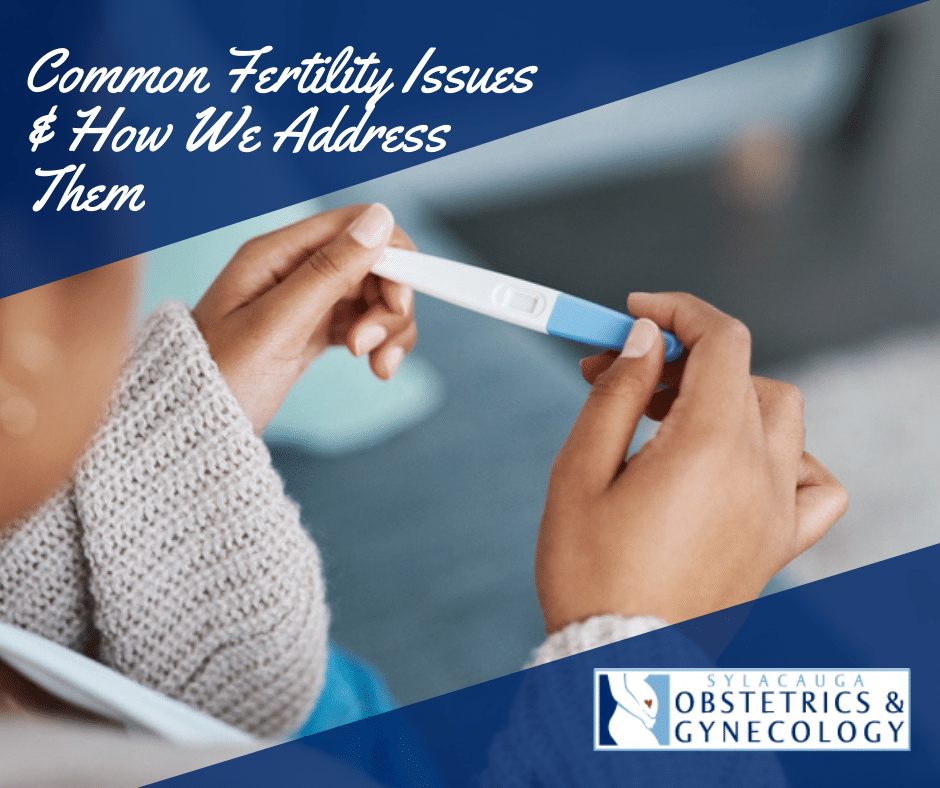
18 Aug Common Fertility Issues & How Sylacauga OB-GYN Can Help
While it might seem pretty straightforward, getting pregnant and staying pregnant are actually complicated processes. Many common fertility issues can come up that may lead to infertility.
When we see our patients going through this, our hearts ache right alongside yours, but we are so thankful that we can play a part in offering couples hope through infertility evaluation, treatments, and possible solutions to common fertility issues.
Common Fertility Issues & How We Address Each One
When you are unable to become pregnant after one year of trying (six months for women 35 and older), we know that it’s time to test for infertility. During this stage of life, you really need a doctor who will provide intensive yet compassionate care through diagnosis and treatment plans based on your specific situation.
This starts with a thorough evaluation to help us figure out what factors may be at play when it comes to your fertility issues.
During an infertility evaluation, we assess the underlying causes of why you haven’t been successful getting pregnant. You and your partner can expect to answer some questions about your health and sexual history, such as:
- What medications are you taking?
- What is your occupation?
- What is your history with tobacco, drug, and alcohol use?
- Do you have a history of illnesses (including but not limited to STIs)?
- Have you ever had surgery?
- What type of birth control have you used?
- How long have you been trying to become pregnant?
After your evaluation, we will conduct tests to help us determine possible causes of infertility. The treatments we offer at Sylacauga OB-GYN for infertility involve different hormones or steroids that can help address the causes of infertility we discover during evaluation and testing. Here are a few of the most common fertility issues we see, including information on how we can treat each one.
Problems with Ovulation
The most common overall cause of female infertility is the failure to ovulate, which occurs in 40% of women with fertility issues. Signs that you are not ovulating include irregular or absent menstrual periods and can result from several causes, such as:
- Ovarian or gynecological conditions, such as primary ovarian insufficiency (POI) or polycystic ovary syndrome (PCOS)
- Aging, including “diminished ovarian reserve,” which refers to a low number of eggs in a woman’s ovaries due to normal aging
- Endocrine disorders, such as thyroid disease or problems with the hypothalamus, which affect the hormones produced by the body so that there might be too much or too little of a hormone or group of hormones
- Lifestyle and environmental factors
We may prescribe the following drugs to assist and encourage ovulation:
- Clomiphene citrate (Clomid, Serophene) treats luteal phase defect (LPD). It may also enhance ovulation in women who are already ovulating.
- Letrozole (Femara) is effective in helping women with polycystic ovary syndrome (PCOS) become pregnant.
- Dexamethasone steroid pill (Decadron) is used in combination with clomiphene when the patient doesn’t respond to clomiphene on its own.
- Metformin (Glucophage) helps with insulin resistance in women with polycystic ovary syndrome (PCOS) and enhances spontaneous ovulation.
Problems with Menstrual Cycle
Problems with the menstrual cycle, the process that prepares the female body for pregnancy, can lead to infertility. The menstrual cycle includes several phases, and problems at any one of the stages can lead to difficulty getting pregnant.
We may use urine tests to allow you to better plan for successful conception by determining an increase in luteinizing hormone levels. A surge in this hormone triggers the release of an egg, so if this test result is positive, it suggests you will ovulate in the next day or two. You can purchase a urine test at any drug store for a home evaluation.
Basal body temperature is another helpful tool when it comes to finding problems with your menstrual cycle. At the time of ovulation, your body temperature increases and remains elevated for the entirety of your menstrual cycle. Charting monthly temperature changes can confirm ovulation but cannot predict it.
We may also do blood tests to check thyroid function since an improperly functioning thyroid can lead to problems with fertility. We want to make sure your thyroid is working normally.
Structural Problems of the Reproductive System
This might include blocked fallopian tubes (from conditions such as endometriosis, pelvic inflammatory disease, and ectopic pregnancy); uterine fibroids, non-cancerous muscle, and tumors on the uterine walls; or physical problems with the uterus.
To address these issues, we perform Hysterosalpingogram (HSG) tests in our radiology department to look for uterine anomalies and tubal patency. During the test, we can determine whether the fallopian tubes are open or blocked. We can also perform an ultrasound to check your uterus and ovaries for any anomalies.
Male Infertility
Male infertility factors contribute to approximately 30% of all infertility cases, and male infertility alone accounts for approximately one-fifth of all infertility cases. Male infertility usually occurs due to abnormal sperm, inadequate numbers of sperm, or problems with ejaculation.
To address possible male infertility, we may perform these tests:
- A semen analysis can check for problems with sperm, such as low sperm count, irregular shape, and poor mobility. For most men, this is the only test that will be needed.
- A blood test can check testosterone, thyroid, and other hormone levels. Genetic blood tests look for chromosomal abnormalities.
- An ultrasound of the scrotum can identify varicoceles or other testicular problems.
Lifestyle Factors
Lifestyle factors can also affect fertility. For men, smoking cigarettes or marijuana and excessive alcohol consumption can affect sperm count and movement. For women, fertility issues can be linked to being underweight, overweight, or excessive exercising.
Most of these factors are within your control, so we may suggest that you and your partner stop smoking, drinking, and doing drugs; lose weight or gain weight; exercise more or less and eat healthier; among other suggestions depending on your specific situation.
What to Expect from Infertility Treatment at Sylacauga OB-GYN
Our protocol for infertility treatment is intensive because we want to ensure you have the best care and support throughout this journey. We will see you often throughout the process, which allows us to make adjustments to your treatment plan as needed. We are also always available and willing to answer any questions along the way.
If you think you may be experiencing fertility issues, schedule an appointment with a qualified fertility doctor like those at Sylacauga Obstetrics & Gynecology. We can review your medical history, discuss your lifestyle habits, and run tests to determine if you have any issues with fertility.
To schedule a fertility consultation, give Sylacauga Obstetrics & Gynecology a call, (256) 487-7783, or send us a message online.
LEARN MORE ABOUT WHAT MAKES SYLACAUGA OBSTETRICS AND GYNECOLOGY A TOP PROVIDER
Sylacauga OB-GYN is the premier provider of obstetric and gynecological services in Sylacauga, Alexander City, Talladega, and the surrounding areas. From your first exam to your new little one’s delivery, our staff and providers are here to make your journey as smooth as possible. At Sylacauga Obstetrics & Gynecology, we are ready to answer your questions, provide support, and guide your process during your baby’s growth!
No need to drive to Birmingham to receive a superior quality of care for you and your impending bundle of joy. We are big town doctors with small-town care! Check out our website or give us a call at 256-487-9346 for more information or to schedule an appointment. For more information about healthy pregnancies, delivery options, and more, give us a call or email us at [email protected].


